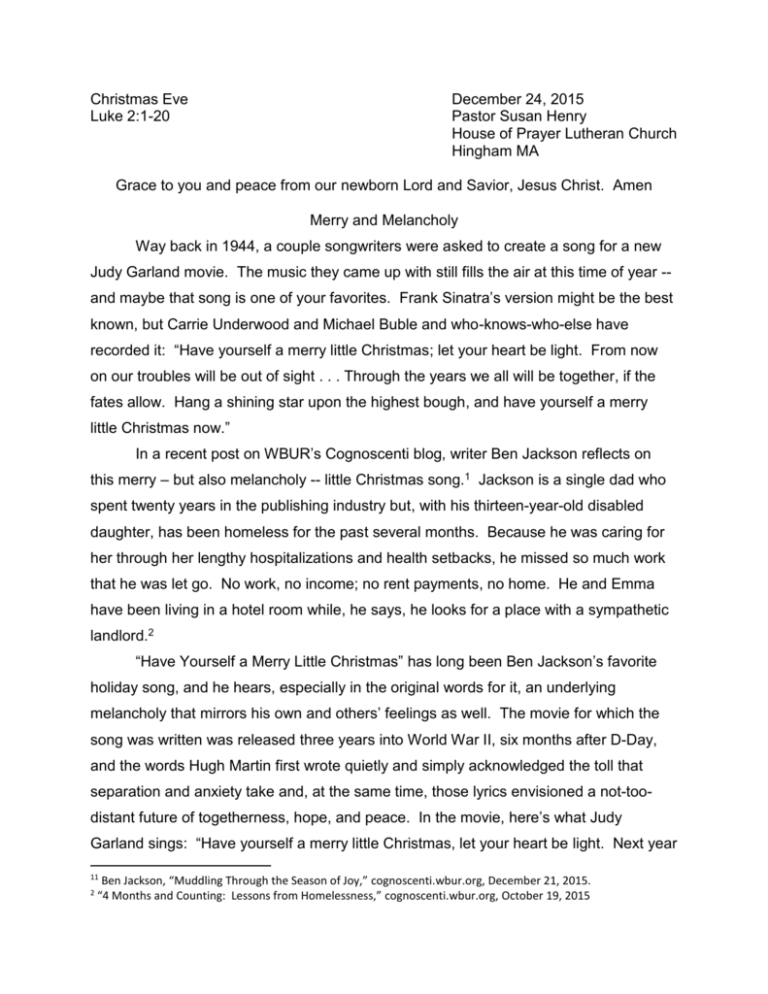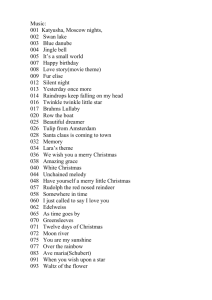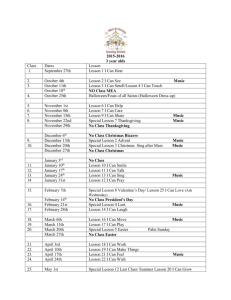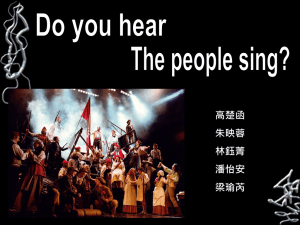Merry and Melancholy - House Of Prayer Lutheran Church
advertisement

Christmas Eve Luke 2:1-20 December 24, 2015 Pastor Susan Henry House of Prayer Lutheran Church Hingham MA Grace to you and peace from our newborn Lord and Savior, Jesus Christ. Amen Merry and Melancholy Way back in 1944, a couple songwriters were asked to create a song for a new Judy Garland movie. The music they came up with still fills the air at this time of year -and maybe that song is one of your favorites. Frank Sinatra’s version might be the best known, but Carrie Underwood and Michael Buble and who-knows-who-else have recorded it: “Have yourself a merry little Christmas; let your heart be light. From now on our troubles will be out of sight . . . Through the years we all will be together, if the fates allow. Hang a shining star upon the highest bough, and have yourself a merry little Christmas now.” In a recent post on WBUR’s Cognoscenti blog, writer Ben Jackson reflects on this merry – but also melancholy -- little Christmas song.1 Jackson is a single dad who spent twenty years in the publishing industry but, with his thirteen-year-old disabled daughter, has been homeless for the past several months. Because he was caring for her through her lengthy hospitalizations and health setbacks, he missed so much work that he was let go. No work, no income; no rent payments, no home. He and Emma have been living in a hotel room while, he says, he looks for a place with a sympathetic landlord.2 “Have Yourself a Merry Little Christmas” has long been Ben Jackson’s favorite holiday song, and he hears, especially in the original words for it, an underlying melancholy that mirrors his own and others’ feelings as well. The movie for which the song was written was released three years into World War II, six months after D-Day, and the words Hugh Martin first wrote quietly and simply acknowledged the toll that separation and anxiety take and, at the same time, those lyrics envisioned a not-toodistant future of togetherness, hope, and peace. In the movie, here’s what Judy Garland sings: “Have yourself a merry little Christmas, let your heart be light. Next year 11 2 Ben Jackson, “Muddling Through the Season of Joy,” cognoscenti.wbur.org, December 21, 2015. “4 Months and Counting: Lessons from Homelessness,” cognoscenti.wbur.org, October 19, 2015 all our troubles will be out of sight. . . . Someday soon we all will be together, if the fates allow. Until then, we’ll have to muddle through somehow, so have yourself a merry little Christmas now.” Do you ever remember hearing that next-to-the-last heartfelt, honest line before? -- “Until then, we’ll have to muddle through somehow.” Ben Jackson is no fan of the “shining star . . . highest bough” revision that Sinatra talked the lyricist into. Words that had once let people acknowledge their melancholy now ask them to pretend that it doesn’t exist. Jackson writes, “[T]hose of us who feel that special kind of holiday melancholy . . . are chided to smile, to feel joy, to hide the sadness that mixes with the other, warmer emotions of this cold season.”3 Surely, at various times in all of our lives, melancholy is an entirely appropriate response to taking a hard, honest look at the world or at our lives. And “muddling through somehow” is often what “doing the best we can” looks like and feels like and is like, whether it’s Christmas or not. “Muddling through” actually has an integrity that bravado or bluster or denial lack. The truth about our lives or the lives of people we know and love is that there’s a lot of “muddling through” happening right now. In the face of people’s anxiety – maybe including yours and mine -- about paying the rent or the mortgage, about warming oceans and diminishing habitats, about terrorism and politics and refugees, about racism and poverty and injustice, there is a whole lot of “muddling through somehow” going on. In anxious times, what we feel may be more than just melancholy. We worry or grieve or are increasingly fearful. Maybe now and then we’re tempted to just give up on the world or on God. And maybe, whether we realize it or not, we have come on this Christmas Eve to hear once again the good news that we do not muddle through alone. God is with us in the muddling, in our making do as best we can. God is with us despite what keeps us apart or makes us anxious or sad. God is with us in the messy, complicated truths about our lives and our world. In Jesus, God’s love for us takes human form. In Jesus, God is with us. 3 “Muddling Through the Season of Joy” Surely Mary and Joseph had been muddling through. You don’t set out on a sixday journey when you’re nine months’ pregnant if you can avoid it. But if you can’t avoid it, you muddle through. When there’s no midwife to help and no proper place to labor and deliver your firstborn, you muddle through. When there’s nothing but a feeding trough to lay your newborn in, you fill it with fresh hay and make do. And you sing. You sing. You sing a lullaby or a lament or a quiet, melancholy, grateful song. And then, totally unexpectedly, you hear from some out-of-breath shepherds how a sky full of angels sang a bold, couldn’t-be-contained song of thanks and praise: “Glory to God in the highest, and peace to God’s people on earth.” Mary sings, and the angels sing, and maybe the shepherds sing on their way back to the fields and the sheep. And we sing, too. In this season, we may sing of holly jolly Christmases and the magic in Frosty’s hat and of having a merry little Christmas whether we “hang those shining stars” or we “muddle through somehow.” In this season, we sing of the little town of Bethlehem, of the angels we have heard on high, of Mary’s baby who has “no crib for a bed,” and of a silent night, a holy night. Beneath and beyond our sweet and sentimental connections to these carols is our deep yearning to know that we are loved by God and that God does not leave us to muddle through life on our own. If we’ve been tempted to give up on the world or on God – or if we’ve done that, or if people we love have done that – the good news of Christmas is that God has not given up on us. God loves us. God is with us. In Jesus, God comes close to us – not only as a vulnerable, helpless baby but also as the one who loves us all the way to the cross and beyond it into a whole new kind of life that is ours as God’s gift. Really, how could we not sing in response to such good news? We might write our songs – like Hugh Martin and like Don and Marygrace Hommen (whose song we’re about to sing). Or we might hum along with Ben and Emma and with Judy Garland or Frank Sinatra. Or we might make songs up as we go – like Mary and like the angels. We sing the old, familiar carols because they speak of and speak to our greatest desires, our deepest fears, our most profound hopes. We sing tonight because, with our voices raised together in song and our hearts bound together by love, we find joy and wonder, strength and courage, hope and a sense of true community. When we sing, we participate – even if just for a moment – in that rich, full, new life God is creating in you and me and in our neighbors near and far and in the whole of God’s good creation. As a wise teacher puts it, “When we sing, we feel the world we can only imagine.”4 So, whether our songs are merry or melancholy or a little of both, let’s keep singing – and let’s have ourselves a merry little Christmas, a muddling-through Christmas, a yearning-for-peace, hope-filled, joyful little Christmas because, in Jesus, God is with us. Amen 4 Mary Luti, “Third Advent: Sing!”


